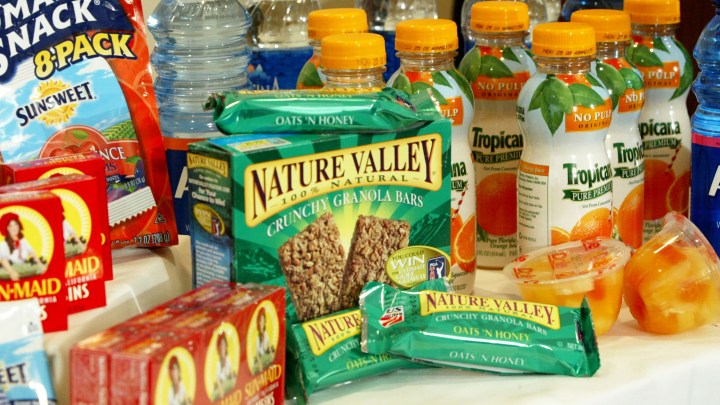
Food companies are banking on our urge to snack

Food companies have been struggling in the last few years, as people are moving away from processed foods like boxed mac-and-cheese and cake mixes. But with 95% of adults reporting that they snack at least once a day, many of those companies’ snack divisions are still doing OK.
One big reason: Food companies are convincing us that snacks are getting healthier.
Jennifer Harris, director of marketing initiatives at the University of Connecticut’s Rudd Center for Food Policy & Obesity, held a series of focus groups with parents of toddlers earlier this year. Harris was trying to get a sense of what kind of snacks parents are buying for their kids.
“In every group, they talk about the fish. The fish! And we finally figured out that they were talking about Goldfish crackers,” Harris said.
In the focus groups, parents reported that Goldfish crackers are convenient — easy to throw in the car or in a bag. But parents also seemed to view them as healthier than other snacks, like chips or cookies.
Harris said this makes sense. Companies like Campbell Soup Company, which owns the Goldfish brand, have been trying to make regular old processed foods sound wholesome, with taglines like “always baked” and “no artificial flavors.”
While old-fashioned products like canned soup and cereal might not be selling well, snacks are a growing source of revenue for food companies — in large part because consumers are demanding snacks they don’t see as junk food.
“We’ve got about one-third of consumers that say they’re snacking on healthier food more today than they were two years ago,” said David Henkes at Technomic, a food consultancy.
Henkes said this has forced a lot of food companies to decide whether they should invest in — or buy — faster-growing companies that sell healthier branded food.
Just this week, Hershey bought the company One Brands, which makes protein bars. Last year, PepsiCo, which sells a lot of Doritos and Lays potato chips, acquired a company called Health Warrior, which has a whole line of snack bars made from chia seeds. In 2017, the candy company Mars bought a stake in Kind, which makes those nut and fruit bars you see at Starbucks.
“We can’t narrowly define a snack any longer as something in a bag or a box,” said John Stanton, a professor of food marketing at Saint Joseph’s University.
Stanton, who has been studying the eating habits of younger consumers, said Gen Z and millennial consumers are further pushing up the demand for snacks, because they use snacks as meal replacements.
“This is a common thing that I hear in my focus groups: ‘Oh I skipped breakfast. I had a breakfast bar instead,’” Stanton said. “I want to say to them, ‘Then you actually didn’t skip breakfast.’”
As snacking continues to grow, food companies know that more occasions to eat snacks means more chances to sell them.
There’s a lot happening in the world. Through it all, Marketplace is here for you.
You rely on Marketplace to break down the world’s events and tell you how it affects you in a fact-based, approachable way. We rely on your financial support to keep making that possible.
Your donation today powers the independent journalism that you rely on. For just $5/month, you can help sustain Marketplace so we can keep reporting on the things that matter to you.


















